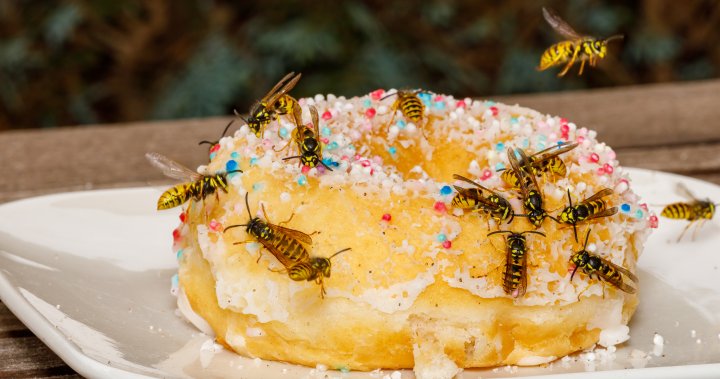As summer comes to an end, Canadians are finding themselves dealing with a significant increase in wasp activity, particularly from yellow jackets. These aggressive insects can be a nuisance at outdoor gatherings, swarming around food and stinging unsuspecting victims. The surge in wasp activity at the end of the season is due to changes in their colony dynamics, causing them to become more aggressive. Despite being bothersome, wasps play a beneficial role in ecosystems by controlling pest populations and acting as pollinators.
One of the main reasons for the increase in wasp activity this year is the higher than usual population inside the colonies. The queen wasps stop producing larvae towards the end of the season, leaving worker wasps without a job or a food source. This drives them to become more aggressive in search of food, which is why they are more present and pesky during late summer. As part of their natural cycle, wasps focus on feeding their larvae with insect fragments to ensure their survival.
Experts have noticed a rise in wasp activity not only in Ontario but also in other provinces like Alberta and Manitoba. The warm weather and abundant food sources have created ideal conditions for wasps to thrive this year. Mild winters in some Canadian provinces have also contributed to the increase in the wasp population, making it easier for the species to overwinter and resulting in less die-off. This has led to more yellow jackets in the spring and even larger colonies.
When it comes to dealing with wasps, it is important to exercise caution, particularly when it comes to removing nests. Visible nests hanging from trees can be treated with insecticide spray and removed, but hidden nests in cracks and crevices should be left to professionals to handle. Attempting to seal off nests using foam or silicone can cause the wasps to find alternative ways out, potentially creating more problems. It is recommended to use commercial wasp traps or fans to deter wasps from gathering near outdoor spaces.
Seeking immediate medical attention is advised if a wasp sting causes unusual swelling, itching, dizziness, or shortness of breath, as severe allergic reactions to the venom can be fatal. Despite their aggressive behavior towards the end of the season, wasps are an important part of the ecosystem and play a role in pest control and pollination. Understanding the reasons behind their behavior can help prevent stings and minimize conflicts with these buzzing insects during late summer gatherings.


